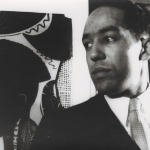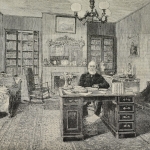Nolueram, Belinda, tuos violare capillos;
Sedjuvat, hoc precibus me tribuisse tuis.
(Martial, Epigrams 12.84)
Sedjuvat, hoc precibus me tribuisse tuis.
(Martial, Epigrams 12.84)
What dire offence from am'rous causes springs,
What mighty contests rise from trivial things,
I sing—This verse to Caryl, Muse! is due:
This, ev'n Belinda may vouchsafe to view:
Slight is the subject, but not so the praise,
If she inspire, and he approve my lays.
Say what strange motive, Goddess! could compel
A well-bred lord t' assault a gentle belle?
O say what stranger cause, yet unexplor'd,
Could make a gentle belle reject a lord?
In tasks so bold, can little men engage,
And in soft bosoms dwells such mighty rage?
Sol thro' white curtains shot a tim'rous ray,
And op'd those eyes that must eclipse the day;
Now lap-dogs give themselves the rousing shake,
And sleepless lovers, just at twelve, awake:
Thrice rung the bell, the slipper knock'd the ground,
And the press'd watch return'd a silver sound.
Belinda still her downy pillow press'd,
Her guardian sylph prolong'd the balmy rest:
'Twas he had summon'd to her silent bed
The morning dream that hover'd o'er her head;
A youth more glitt'ring than a birthnight beau,
(That ev'n in slumber caus'd her cheek to glow)
Seem'd to her ear his winning lips to lay,
And thus in whispers said, or seem'd to say.
"Fairest of mortals, thou distinguish'd care
Of thousand bright inhabitants of air!
If e'er one vision touch'd thy infant thought,
Of all the nurse and all the priest have taught,
Of airy elves by moonlight shadows seen,
The silver token, and the circled green,
Or virgins visited by angel pow'rs,
With golden crowns and wreaths of heav'nly flow'rs,
Hear and believe! thy own importance know,
Nor bound thy narrow views to things below.
Some secret truths from learned pride conceal'd,
To maids alone and children are reveal'd:
What tho' no credit doubting wits may give?
The fair and innocent shall still believe.
Know then, unnumber'd spirits round thee fly,
The light militia of the lower sky;
These, though unseen, are ever on the wing,
Hang o'er the box, and hover round the Ring.
Think what an equipage thou hast in air,
And view with scorn two pages and a chair.
As now your own, our beings were of old,
And once inclos'd in woman's beauteous mould;
Thence, by a soft transition, we repair
From earthly vehicles to these of air.
Think not, when woman's transient breath is fled,
That all her vanities at once are dead;
Succeeding vanities she still regards,
And tho' she plays no more, o'erlooks the cards.
Her joy in gilded chariots, when alive,
For when the fair in all their pride expire,
To their first elements their souls retire:
The sprites of fiery termagants in flame
Mount up, and take a Salamander's name.
Soft yielding minds to water glide away,
And sip with Nymphs, their elemental tea.
The graver prude sinks downward to a Gnome,
In search of mischief still on earth to roam.
The light coquettes in Sylphs aloft repair,
And sport and flutter in the fields of air.
Know further yet; whoever fair and chaste
Rejects mankind, is by some sylph embrac'd:
For spirits, freed from mortal laws, with ease
Assume what sexes and what shapes they please.
What guards the purity of melting maids,
In courtly balls, and midnight masquerades,
Safe from the treach'rous friend, the daring spark,
The glance by day, the whisper in the dark,
When kind occasion prompts their warm desires,
When music softens, and when dancing fires?
'Tis but their sylph, the wise celestials know,
Though honour is the word with men below.
Some nymphs there are, too conscious of their face,
For life predestin'd to the gnomes' embrace.
These swell their prospects and exalt their pride,
When offers are disdain'd, and love denied:
Then gay ideas crowd the vacant brain,
While peers, and dukes, and all their sweeping train,
And garters, stars, and coronets appear,
And in soft sounds 'Your Grace' salutes their ear.
'Tis these that early taint the female soul,
Instruct the eyes of young coquettes to roll,
Teach infant cheeks a bidden blush to know,
And little hearts to flutter at a beau.
Oft, when the world imagine women stray,
The Sylphs through mystic mazes guide their way,
Thro' all the giddy circle they pursue,
And old impertinence expel by new.
What tender maid but must a victim fall
To one man's treat, but for another's ball?
When Florio speaks, what virgin could withstand,
If gentle Damon did not squeeze her hand?
With varying vanities, from ev'ry part,
They shift the moving toyshop of their heart;
Where wigs with wigs, with sword-knots sword-knots strive,
Beaux banish beaux, and coaches coaches drive.
This erring mortals levity may call,
Oh blind to truth! the Sylphs contrive it all.
Of these am I, who thy protection claim,
A watchful sprite, and Ariel is my name.
Late, as I rang'd the crystal wilds of air,
I saw, alas! some dread event impend,
Ere to the main this morning sun descend,
But Heav'n reveals not what, or how, or where:
Warn'd by the Sylph, oh pious maid, beware!
This to disclose is all thy guardian can.
Beware of all, but most beware of man!"
He said; when Shock, who thought she slept too long,
Leap'd up, and wak'd his mistress with his tongue.
'Twas then, Belinda, if report say true,
Thy eyes first open'd on a billet-doux;
Wounds, charms, and ardors were no sooner read,
But all the vision vanish'd from thy head.
And now, unveil'd, the toilet stands display'd,
Each silver vase in mystic order laid.
First, rob'd in white, the nymph intent adores
With head uncover'd, the cosmetic pow'rs.
A heav'nly image in the glass appears,
To that she bends, to that her eyes she rears;
Th' inferior priestess, at her altar's side,
Trembling, begins the sacred rites of pride.
Unnumber'd treasures ope at once, and here
The various off'rings of the world appear;
From each she nicely culls with curious toil,
And decks the goddess with the glitt'ring spoil.
This casket India's glowing gems unlocks,
And all Arabia breathes from yonder box.
The tortoise here and elephant unite,
Transform'd to combs, the speckled and the white.
Here files of pins extend their shining rows,
Puffs, powders, patches, bibles, billet-doux.
Now awful beauty puts on all its arms;
The fair each moment rises in her charms,
Repairs her smiles, awakens ev'ry grace,
And calls forth all the wonders of her face;
Sees by degrees a purer blush arise,
And keener lightnings quicken in her eyes.
The busy Sylphs surround their darling care;
These set the head, and those divide the hair,
Some fold the sleeve, whilst others plait the gown;
And Betty's prais'd for labours not her own.




















Comment form: